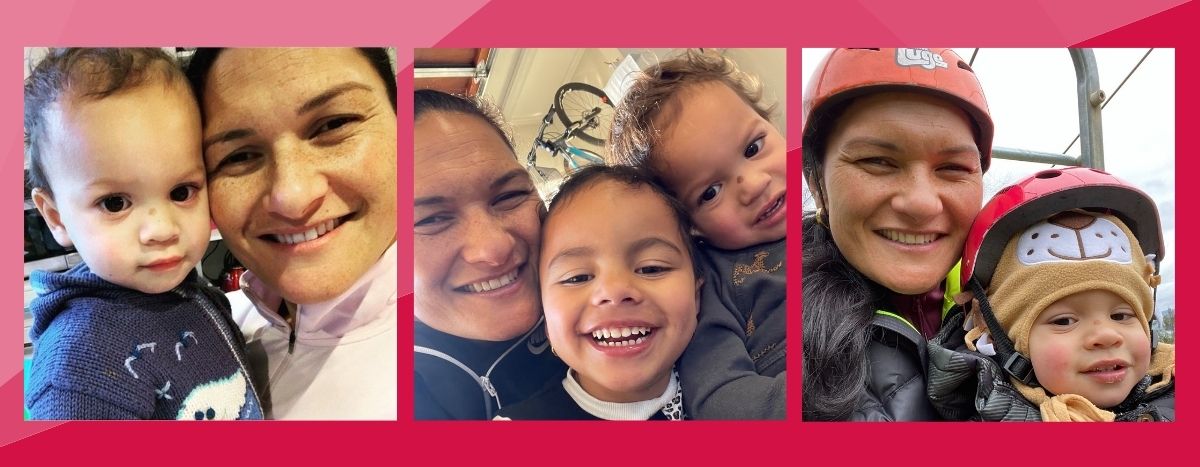Life Insurance
Lump sum payment if you were to pass away or are diagnosed with a terminal illness.
AIA Vitality NZ - 5 min read
29 November 2021
Dame Valerie Adams was busy training for the Olympics when her son, Tava, was diagnosed with type 1 diabetes.

Everything happened on July 19 2020. I noticed Tava was lethargic throughout the week and was urinating profusely. His temperature was normal but I had this inclination that it might be type 1 diabetes, so we called Healthline.
We explained the symptoms and were told to go to the hospital immediately. When we got there, the doctors had to try hard to find a line because he was so dehydrated. He was being poked and prodded, it was hard to watch. They also had to keep taking blood to check his levels. It was a very painful time for my poor child.
When his diagnosis was confirmed, I was devastated. I wanted to take all the pain away from him. It was a very emotional period for our family, and it was incredibly heartbreaking.
Eventually, they were able to bring his blood glucose levels down safely and we were transferred to a ward. We were in the hospital for seven days, and we got an intensive crash course on type 1 diabetes before we were discharged.
Initially, we were afraid to leave the hospital, because the doctors and nurses were all there. When we came home, it felt like we had a newborn baby – that same sense of nervousness and paranoia. We were up every hour pricking his finger, it was awful.
Even when we had access to our doctor 24 hours a day, it was still nerve-wracking. If I was asleep, my husband would be awake. If both of us were asleep, his grandma would be awake. The three of us would be running in circles trying to care for him.
The thing that really scared me was the thought of him getting bad hypoglycaemia, when blood sugar levels drops far below the healthy range. If that happens, you need to take a glucagon pen (basically a needle full of glucose) and inject it into the muscle, then call the hospital right away. The doctors said we might only have to do this once or twice in his life, but I’m terrified of the idea. If his levels are that low, he’s got no control over his body. He’s almost gone. Now, I just make sure his blood sugar doesn’t drop. If I see the glucose levels dipping, it’s snack time.
"I don’t want Tava to be known as ‘the diabetic’, he’s a child with diabetes, and he will have to learn how to manage this for the rest of his life. "
All of this happened in the lead up to Tokyo. I found myself in a challenging time and felt scared and guilty about leaving him so I could train. Luckily, I have a great support network. My husband and mother in-law stepped up and really helped Tava and I, and they also helped me continue my journey, live my dream, and represent New Zealand at the Games. Still, I had a lot of mum guilt. It’s so tough to leave your child in someone else’s hands, especially when he has an illness. I felt heartbroken the whole time I was away training and competing.
A couple of months down the line, we discovered a device we could attach to Tava, letting us get his blood glucose readings on our phones – just so we’re not constantly causing him pain. We’re now fifteen months in, and we've become more relaxed about Tava’s condition. I had to learn to let go – now we now know that not every situation requires you to react so intensely.
I don’t want Tava to be known as ‘the diabetic’, he’s a child with diabetes, and he will have to learn how to manage this for the rest of his life. We make sure that we give him a normal upbringing and open every opportunity we can to just let him be a kid, while my husband and I discreetly look at our phones and monitor what's happening.
I don't want him to be treated any differently by anyone. We are a type 1 diabetes family now, and – I'm not going to lie – it can be tough. It would be a thousand times easier not to have this life, but our reality is what it is – and we love him dearly.
One thing that's helped me is talking to parents who have kids the same age. I had the opportunity to really connect with a couple of mums who’ve been living with this for longer than I have. I can ask them questions and speak to them openly as a mother and not as Dame Valerie Adams, the athlete.
Do things in your own time. Grieving the loss of your life that you were ‘supposed’ to have is something that you will get through in your own time – I wouldn’t rush that process. I sought professional help after the diagnosis because it disrupted me more than I thought. At the end of the day, you have to work through it and know that you’re going to be your child's number one supporter.
The most important thing I learned over these past 16 months is to be kind to myself. I think I put a lot of pressure and strain on my identity as a mum. Know you're doing your best and you're doing right by your children – even if it feels hard to accept at times.
November is Diabetes Awareness Month click here to find out how you can get involved and show your support.